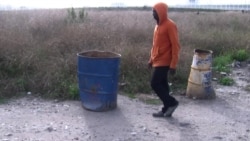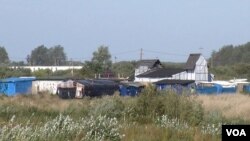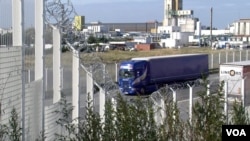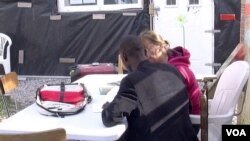Gulls screech and swoop for scraps of french fries on the parking lot at Calais port, where massive ferries glide out to open water. On a clear day, the white cliffs of Dover — El Dorado, as far as many migrants here are concerned — can be seen from this northern French town.
But the Sudanese, Eritreans, Afghans and Syrians packed into a sprawling tent camp nearby — up to 10,000 people, charity groups say — see little beyond the windblown grasses and dirt paths that rains quickly turn to muddy rivers.
In a matter of weeks, visions of Britain will grow even more distant. The French government promises to close the ‘Jungle’ migrant camp by year’s end.
A wall rises
As the camp closes, a kilometer-long, Britain-funded wall is being built on the main artery to the port as an added deterrent. Now, just a muddy track abutting the main highway to Calais port, the estimated $30 million concrete barrier aims to prevent migrants from stowing away on trucks or ferries to Britain. But despite its relatively modest size, and vegetation to soften its image, many see what is being dubbed the ‘great Wall of Calais’ as testament to the barriers rising across the European Union against the flood of asylum-seekers.
“This is Europe,” says Malcolm Astell, a British volunteer working at the camp. “And I’ve never been so concerned about Europe as a place of progress and harmony and generally doing the right thing.”
Migrant settlements have long dogged this working-class town, just 50 kilometers across the Channel from England. Before the Jungle, there was Sangatte. The closure of that camp in 2002 simply displaced the problem to points nearby.
Today, the leftist government promises a more durable and humane solution; resettling migrants in shelters around the country. Those who fail to receive asylum status, it says, will be deported.
“There will be no new migrant camp in Calais, or any other shelter,” President Francois Hollande vowed during a visit to Calais last week.
A durable solution?
But many, like bakery owner and local business leader Frederic Van Gansbeke, are doubtful.
“The camp must absolutely be demolished if we’re going to relaunch our economy,” says Van Gansbeke, who blames negative media coverage of Calais’ migrant problems for sinking the town’s image and its tourist-dependent economy. “I have nothing against the migrants. But after we disperse these thousands, what if we get 50, 60 more arriving daily — can we stop the flow?”
As for the wall, “it’s useless,” Van Gansbeke says, “except to further degrade the image of Calais.”
Authorities say the wall’s construction will continue, despite local opposition that includes Calais’ conservative mayor, Natacha Bouchart. Nearly half-a-dozen migrants have died so far this year trying to scramble aboard trucks. Vehicles face dangerous roadblocks erected by migrants to ambush rides.
Political flashpoint
More broadly, Calais has become a political flashpoint ahead of presidential elections next spring. Paying his own visit here last month, conservative candidate and former president Nicolas Sarkozy outlined a hard-line response to migration, including shifting border controls to Britain.
Yet far-right National Front candidate Marine Le Pen, who is riding high in national polls, may reap the biggest payback. Her anti-immigrant party polls particularly strongly in the Hauts-de-France region, where Calais is located.
Across the country, some mayors are joining a Front campaign against accepting migrants in their towns.
“Dispatching the migrants everywhere in France won’t resolve the problem; it will just create mini-Calais everywhere,” says National Front regional councilor Rudy Vercucque, disparaging the government’s strategy. “Walls don't solve the problem. The solution today is to recapture our national sovereignty, starting with erecting real borders.”
Yet from Spain's North African enclave of Ceuta, to Hungary, which held a referendum on rejecting EU migrant quotas, walls are becoming a popular, if imperfect response to the migrant crisis.
Not a solution
“One of the problems with Europe’s approach to migration is that it hasn’t really done enough to deal with the root causes,” says Ian Bond, director for foreign policy at the London-based Center for European Reform. “It hasn't had a real strategy for the Syrian conflict. And guess what? Big war, lots of atrocities, a lot of people trying to get away from that.”
Migration expert Olivier Clochard, of Poitiers University in France, believes the government’s strategy for the Jungle is better than leaving a teeming, festering camp. But it is no solution.
“Maybe it’s a solution for the thousands who are there,” he says, “but more will keep arriving.”
At the Jungle, many migrants seem unaware that another barrier is rising up in an area already choking in tall, wire fences.
But they know the camp will be demolished soon.
“I will sleep on the motorway,” says 17-year-old Afghan Isa Khan as he watches friends kick a soccer ball nearby. “I no stay in France.”










